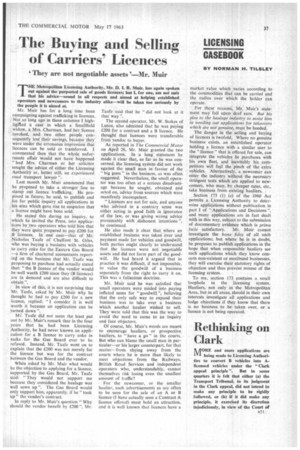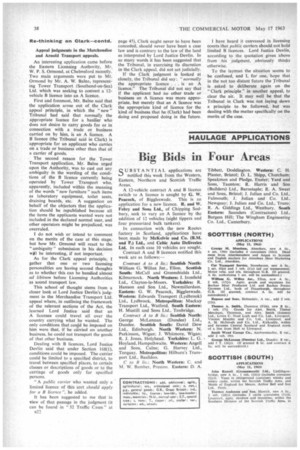Rethinking on Clark
Page 39

Page 40

If you've noticed an error in this article please click here to report it so we can fix it.
lk /TORE and more applications are "I being made to Licensing Authorities to convert B vehicles into Alicensed vehicles under the "Clark appeal principle ". But in some quarters it is felt that either (a) the Transport Tribunal, in its judgment in the Clark appeal, did not intend to make any principle to be rigidly followed, or (b) if it did make any principle, it exercised its discretion injudiciously, in view of the Court of Appeal judgments in the Merchandise and Arnold Transport appeals.
An interesting application came before the Eastern Licensing Authority, Mr. W. P. S. Ormond, at Chelmsford recently, Two main arguments were put to Mr. Ormond by Mr. A. W. Balne, representing Tower Transport (Southend-on-Sea) Ltd. which was seeking to convert a 12vehicle B licence into an A licence.
First and foremost, Mr. Babe said that the application arose out of the Clark appeal principle, in which the " new " Tribunal had said that normally the appropriate licence for a haulier who does not desire to carry goods for or in connection with a trade or business carried on by him, is an A licence. A B licence (the Tribunal said in Clark) is appropriate for an applicant who carries on a trade or business other than that of a carrier of goods.
The second reason for the Tower Transport application, Mr. Balite urged upon the Authority, was to cast out any ambiguity in the wording of the conditions of the B 'Licence currently being operated by Tower Transport who, apparently, included within the meaning of the words "new furniture " such items as laboratory equipment, toilet seats, draining boards, etc. A suggestion on behalf of the objectors that the application should be republished because all the items the applicants wanted were not included in the declared normal user, and other operators might be prejudiced. was overruled.
I do not wish or intend to comment on the merits of the case at this stage, but how Mr. Ormond will react to the "ambiguity" submission in his decision 141 be interesting, if not important.
As for the Clark appeal principle, gather that one or two licensing personalities are having second thoughts as to whether this can be bandied almost ad libitum before Licensing Authorities as sound transport law.
This school of thought stems from a closer look at Lord Justice Devlin's judgment in the Merchandise Transport Ltd. appeal where, in outlining the framework of the relevant sections of the Act, the learned Lord Justice said that an A licensee could travel all over the country carrying what he wanted. The only conditions that could be imposed on him were that, if he carried on another business, he could not transport the goods of that other business.
Dealing with B licences, Lord Justice Devlin said that under Section 168(1), conditions could be imposed. The carrier could be limited to a specified district, to travel between specified places, to certain classes or descriptions of goods or to the carriage of goods only for specified persons.
" A public carrier who wanted only a limited licence of this sort should apply for a B licence", he added.
It has been suggested to me that in view of that passage in the judgment (it can be found in "32 Traffic Cases" at n22 page 45), Clark ought never to have been conceded, should never have been a case law and is contrary to the law of the land as interpreted by Lord Justice Devlin. In so many words it has been suggested that the Tribunal, in exercising its discretion in the Clark appeal, did not act judicially.
If the Clark judgment is looked at closely, the Tribunal did say: "normally the appropriate licence . . . is an A licence." The Tribunal did not say that if the applicant had no other trade or business an A licence was more appropriate, but merely that an A licence was the appropriate kind of licence for the kind of business that he (Clark) had been doing and proposed doing in the future. I have heard it canvassed in licensing courts that public carriers should not hold limited B licences. Lord Justice Devlin, according to the quotation given above from his judgment, obviously thinks otherwise.
To the layman the situation seems to be confused, and I, for one, hope that in the not too distant future the Tribunal is asked to deliberate again on the "Clark principle" in another appeal, to clear the air. It may well be that the Tribunal in Clark was not laying down a principle to be followed, but was dealing with the matter specifically on the merits of the case.












































































































